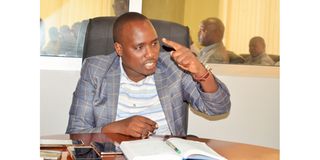How minerals minister can survive sack: experts

Minister for Minerals, Dotto Biteko
Dar es Salaam. Extractive industry experts are of the conviction that the Minerals docket is marred with deep-rooted challenges that will continue to deny the country its fair share from the exploitation of its mineral resources.
This means, if the challenges are not tackled from their roots, then the faces of ministers heading the docket will keep changing.
In the latest mini cabinet reshuffle, President John Magufuli appointed Mr Dotto Biteko as the minister for Minerals replacing Ms Angellah Kairuki. Before the appointment, Mr Biteko served as the deputy minister in the same docket.
This appointment makes three the number of ministers who have served in the docket since President Magufuli took office three years ago.
The first Prof Sospeter Muhongo, who was removed from the then ministry of Energy and Minerals for “failing to stop the theft of mineral resources through export of copper concentrates”, according to Dr Magufuli.
The Head of State said he removed Ms Kairuki “for failing to stop smuggling of gold out of the country.” In fact, the dismissal came hot on the heels of reports of an attempt to smuggle out of the country some 323.6 kilos of gold. The culprits, who included police officers, were arrested and have since been charged in court.
The appointment of Mr Biteko also comes slightly a year after President Magufuli split the Energy and Minerals ministry into two to increase efficiency.
The decision was made on the suggestions of two presidential committees made to probe exports of copper concentrates by Acacia Mining Company.
In addition to this change, the government went ahead and passed some key laws to enforce the sovereignty of Tanzania over its natural resources.
These were the Natural Wealth and Resources Contracts (Review and Re-Negotiation of Unconscionable Terms) Act, 2017, the Natural Wealth and Resources (Permanent Sovereignty) Act, 2017; and, the Written Laws (Miscellaneous Amendments) Act, 2017.
But, experts warn that if the aspirations following the law changes were to be realised, the country should go beyond changing individual ministers.
There are feelings that President Magufuli could be falling in the same trap as his predecessor Jakaya Kikwete, who kept changing ministers for the then Energy and Minerals docket but without truly realising the intended changes.
A total of five ministers served in the Energy and Minerals docket in Mr Kikwete’s administration.
These were Dr Ibrahim Msabaha, Mr Nazir Karamagi and Mr William Ngeleja. Others were Prof Sospeter Muhongo and Mr George Simbachawene. Even with these frequent changes, one scandal after another kept rocking the ministry.
How much powers do ministers have in making reforms?
A researcher of extractive and energy resources at Roskilde University, Mr Thabit Jacob, says that the big question in relation to changes of Minerals ministers is how much powers does a minister have to make concrete changes and decisions.
“It’s worth noting that powers to make key decisions in both Energy and Minerals lies with the President, through the Cabinet,” he notes in an interview with The Citizen.
And now the presidential powers to make the decisions have been given statutory powers in accordance to the new Sovereignty Act (Section 5), which places these resources under the custodianship of the President. Previous laws vested the control of natural resources on the United Republic of Tanzania, the researcher explains.
Mr Jacob, who has coauthored a paper that analyses the changes which took place in the extractive governance in recent years, argues that whereas some new features related to President Magufuli’s personality may explain some of the new nationalism, the continuation of trends from previous administrations remain pronounced.
A senior officer with the Tanzania Chamber of Minerals and Energy, who asked not to be named, argued that differences in priorities between the President and the Minerals minister could be among factors leading to what President Magufuli often refers to as “failures in the ministry” and which ultimately lead to reshuffles.
“Take the removal of Ms Kairuki, for instance, the President blamed her for failing to oversee the establishment of mineral centres as per the laws. I’m sure it’s not that the minister had no such plans, but that such centres were not on top of her list of priorities,” said the officer.
To solve the problem, he offered a suggestion that it would require the respective minister to closely involve the President on every step towards any decision that he/she intends to take so that priorities of the two offices align.
Mr Richard Ndassa, who chaired the Energy and Mineral parliamentary committee in 2015, says frequent replacement of Minerals ministers is not surprising due to the sensitivity of the docket to the national economy and the corruption temptations that it induces to its responsible ministers.
“That ministry [of Minerals] is very complex. It’s important that anyone appointed to head it should be conversant with its challenges and must be ready to cooperate with the ministry’s technocrats in finding long-lasting solutions,” notes Mr Ndassa, Sumve MP (CCM).
“This is why it is very important for the new minister to have some knowledge on the country’s Minerals sector,” adds Mr Ndassa.




